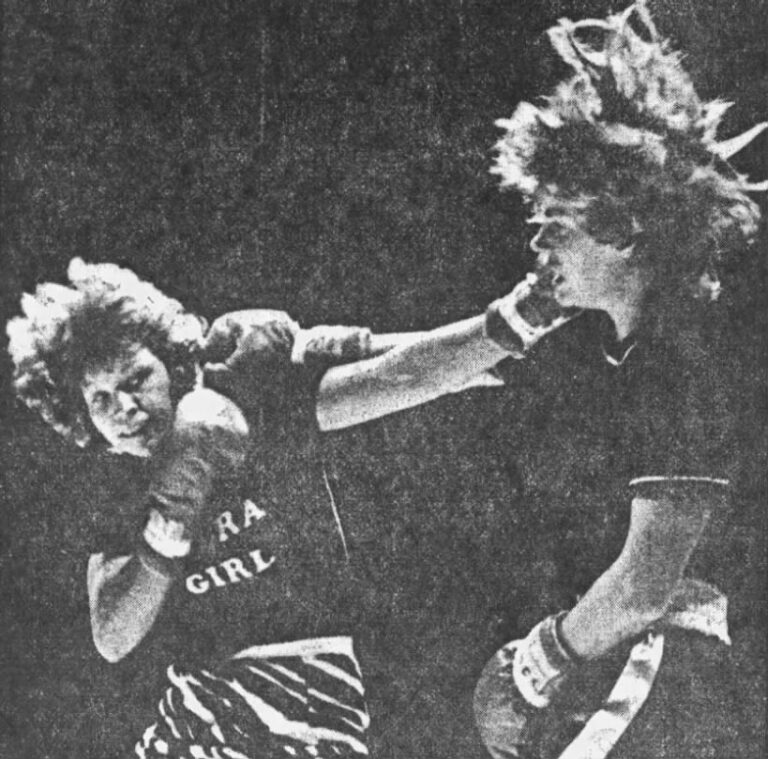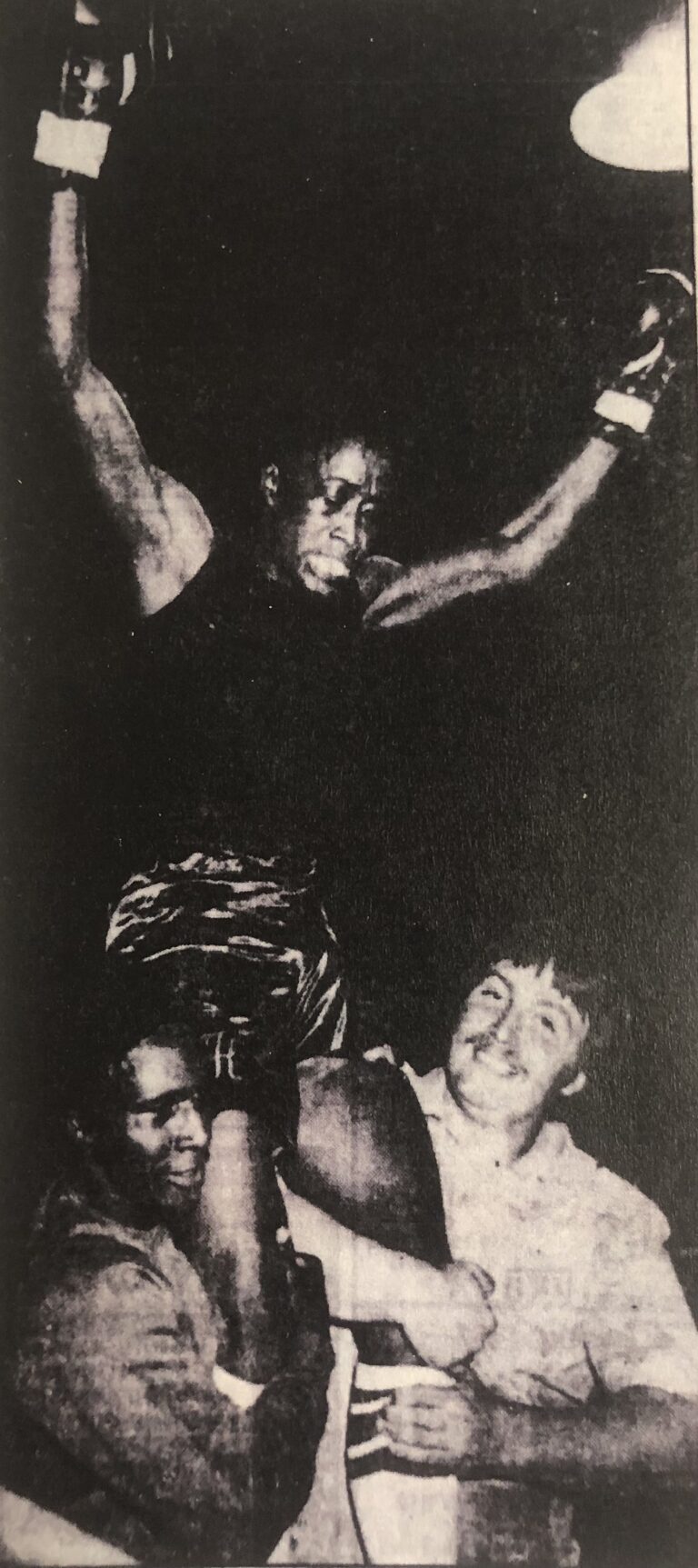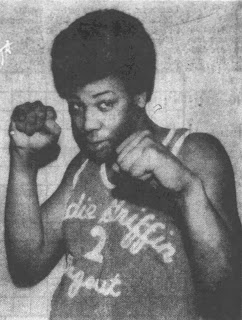Written by Christopher Benedict
“The majority of women in professional boxing is in it for the money. Otherwise, we wouldn’t subject ourselves to the catcalls and remarks on how undignified boxing is for young ladies,” Shirley Tucker wrote in an October 18, 1977 editorial printed in the San Francisco Examiner. The byline simply carried her ring moniker, Zebra Girl. “I feel that women have come a long way since being allowed equal rights to vote and I feel professional boxing is no more undignified for women than softball, tennis, swimming, bowling, and other sports.”
Knee-jerk conclusions which ran rampant at the time that female prizefighters must obviously be gay irritated Zebra Girl tremendously. “I’m no more a homosexual than my mother and she had thirteen children,” Tucker retorted. Born in Redmon, Oregon, Shirley was one of nine girls in the Tucker household.
A twenty-one year-old single mother fighting out of Santa Rosa, California, Zebra Girl had two children of her own at the dawn of her pugilistic career in 1977, a son Jamie and daughter named Kori. As for her parents, Shirley’s mother Lahoma not only supported her decision to box professionally but sometimes worked her corner on fight nights. The same could not be said for Tucker’s father, who did not endorse his daughter’s chosen vocation.
When she put her boxing gloves and trademark black and white striped trunks in permanent storage in 1982, Shirley left her unique imprint on the sport thanks to a lengthy list of achievements and historic firsts. The most formidable opponent Tucker went toe to toe with was the California State Athletic Commission, but the obstinate functionaries met their match in Zebra Girl. Just as she emerged victorious in all of her sixteen career bouts, Shirley prevailed every time she squared off against the Commission.
The word “capitulate” was not in her vocabulary. “Pioneer,” on the other hand, was a word Zebra Girl Tucker personified. Even if blazing fresh trails was not necessarily first and foremost on her agenda.
“I’m no crusader for women’s rights,” she admitted. “I just want to be somebody. I want to prove women can box and don’t have to stay in the kitchen and cook. Quite a few people have tried to talk me out of fighting, but I tell them to just give me a chance. That’s all I want, to become a world champion.” Tucker also spoke of her dream to make enough money from boxing to be able to retire comfortably and open an establishment she envisioned calling the Zebra Cocktail Lounge.
Even for today’s select few headlining top-earners like Katie Taylor, Claressa Shields, and Amanda Serrano, purse money for women boxers is still woeful when compared to their male counterparts. In the 1970s though, it was literally pennies on the dollar. A couple hundred bucks at best. Tucker, however, was able to bank a sizeable payday in her fourth pro fight while breaking down a gender barrier on a distant continent in the process.
“I got $3,500 for stopping Jamie Gayden in the fourth round in Accra, Ghana last year,” Zebra Girl boasted in 1979. Under the tutelage of trainer Al Lemay, she had debuted against Gayden six months prior, winning on points in Lake Tahoe and notched two KO victories—over Paula Trichel and Edie Hoag—in the meantime. “They had never seen women boxers in Africa before, so we made history in front of a couple thousand people.”
Other than blatant misogyny, one of the main reasons for the meager payouts to female fighters of this era was that their compensation was proportional to the women’s deliberately reduced work rate. The California State Athletic Commission had arbitrarily determined that women’s bouts could be contested at a duration of no more than four two-minute rounds. Backed by the ACLU (American Civil Liberties Union), Zebra Girl strenuously petitioned the Athletic Commission in an attempt to have this limitation abolished in 1979.
She had been an outspoken advocate for the lifting of the CSAC’s four-round restriction since being issued her boxing license two years earlier. Lady Tyger Trimiar, Shirley’s friend and sparring partner and future world lightweight champion, was also heavily involved in the cause and attended Committee meetings to voice her opposition to the four-round regulation.
“Boxing promoters may use woman boxers one time because of the novelty of seeing two women flailing gloves at each other, but after that it’s not economical for them to use us again,” Tucker theorized in the aforementioned editorial penned in 1977. “Most of us women have families to support. I have two children to support and, with the current four-round law, the amount of money I can make is restricted…The law change would make promoters more amenable to using us regularly. Then a woman’s world rating could be published and some of us would be fortunate enough to be champion of the whole wide world in our weight class.”
Shirley’s ceaseless persistence paid dividends and the CSAC abolished its four-round rule. This earned Zebra Girl an additional nickname, The Girl Who Kayoed a Commission, bestowed upon her by Mary-Ann Noble of Boxing Illustrated, the only mainstream publication of its time that gave serious consideration to female fighters.
On February 11, 1979 Tucker participated on the first ever all women’s boxing card, held at the Hawthorne Memorial Center. She came out on top of a five-round split verdict over Toni Lear Rodriguez, against whom Zebra Girl would face off on three subsequent occasions. Despite the fact that she lost all four of their fights, Rodriguez would last the full distance in each contest, setting her apart as the only one of Tucker’s nine different adversaries to not fall victim to a Zebra Girl KO.
1980 was a landmark year for Tucker with three history-making fights all occurring at the Santa Rosa Veterans Memorial Auditorium. It started off in style on January 10 when she main evented a five-bout card additionally featuring a pair each of women’s and men’s fights. This marked the first time, in California anyway, that a women’s match headlined a boxing show with men fighting on the undercard.
Former actress Amy Levitt (Dog Day Afternoon, The Streets of San Francisco) made her boxing debut by outpointing fellow novice Denise Coleman, while Paula Trichel earned a split decision over Cheryl Laudd in the female preliminaries. The conclusion of that evening’s abridged feature attraction came when Zebra Girl Tucker laid Denise Moorehead out flat with a right uppercut at 1:15 of the second round.
A New York film crew was in town to document the proceedings for the airing of highlights on TV, which was how Zebra Girl was brought to the attention of Don King. And he liked what he saw. So much so that the Barnumesque promoter famous for hyping up fights with nursery rhyme ballyhoo and wearing his hair in a perpetual finger in the light socket style went so far as to consider putting her on one of his shows.
“It would really be something super because then you would not view that as in a feminine situation where they’re delicate and dainty and they can’t help themselves,” opined King. “When you see this young lady, she can perform.” King would never make a formal entreaty to Tucker, nor would he make good on his word to promote Lady Tyger, who ended her 1987 hunger strike only when he promised her to do so. It wouldn’t be until he went into business with Christy Martin that King would step foot into the realm of women’s boxing. And not out of any instinct toward philanthropy but because he viewed the marketable ‘Coal Miner’s Daughter’ as a lucrative investment opportunity.
Zebra Girl headlined her second consecutive show at the Santa Rosa Veterans Memorial Auditorium two months later, pitted opposite Ginate Troy in California’s first ever female bout scheduled for ten rounds. The fight went ahead without incident despite its violation of the new eight-round limit for women’s matches imposed by the Athletic Commission. As significant as this was, it turned out to be a moot point as only one minute and twenty-five seconds were required for Shirley to put Troy down for the count before a sold-out crowd courtesy of her thunder crack of a right hand. They were no strangers to one another, Tucker and Troy having met twice before with the final bell likewise not having been tolled on either of those occasions.
Now 13-0 with 7 KOs, Zebra Girl was beyond a doubt the top-ranked women’s bantamweight and more than worthy of a shot at a world title. Johnny Dubliss, a manager, trainer, writer, advocate for women’s boxing, and general manager of Glove Boxing Promotions, had evidently been trying in vain for months to match Zebra Girl against similarly undefeated Graciela Casillas for the WBB bantamweight belt. Instead, he turned his focus to the Nevada State bantamweight champion, Karen Bennett.
“I’m finally fighting a fighter instead of the flakes they keep bringing on,” professed Tucker, who had earned a split decision victory in her previous bout with Bennett two years prior in only her fifth outing. “I won’t predict when I’ll win, but I’ll tell you she’ll be carried out of the ring this time.”
Another run-in with the California State Athletic Commission was inevitable when Johnny Dubliss advertised the Zebra Girl/Karen Bennett title fight as a then-unprecedented twelve-round contest. CSAC executive officer Jim Biaz swiftly threatened Dubliss with disciplinary measures such as levying $2,500 fines against both Tucker and Bennett for which he would be responsible and/or impounding the gate receipts, if not pre-emptively shutting the show down altogether unless the number of rounds was reduced to the requisite amount of eight.
“I told them we would be going ahead with the 12-rounder,” vowed a noncompliant Dubliss, who had already sold 400 advance tickets. “I hope I know what I’m doing. This could be a $5,000 gamble. And I could lose my promoter’s license.” Citing sex discrimination, Dubliss obtained a restraining order through his attorney Ray Estabrook which would allow the event to transpire as planned.
Indeed, chief inspector Jim Robertson sat ringside in Santa Rosa for the entirety of the card, stating that he had “no instructions to interfere with the proceedings.” Interference by the Commission from the outset was short-sighted. On the night, attempting to stop the fight from going past eight rounds would have proved strictly academic. Halfway through round six, Zebra Girl stopped Bennett cold to claim the WBB world bantamweight title.
In 1982, Tucker had sought the guidance of ACLU general counsel Margaret Crosby to represent her with regard to once more lobbying against the State Athletic Commission. This time for the purpose of being granted permission to campaign in the ring against a man. Shirley’s manager and promoter Joe Bradley Sr. confirmed that Johnny ‘Bang Bang’ Jackson, a local super-featherweight whose seventeen bouts to that point (one win and sixteen defeats) had all ended by way of knockout, was agreeable to such a proposition.
After months of debate, the Commission inconceivably ruled in Tucker’s favor that November. “We had no recourse but to approve it,” executive officer Don Fraser was quoted as saying.
However, Johnny Jackson, also a trainer and promoter, was serving a suspension for bouncing checks and unavailable for the foreseeable future. No other licensed males expressed any interest whatsoever in boxing a woman, therefore Zebra Girl’s ambition to compete in a mixed gender match went unfulfilled and her July 23 knockout of rookie Billie Jo Finley would be Tucker’s final fight.
Sources:
Ralph Leef. Zebra Girl Leads Way Again (Santa Rosa Press Democrat, March 3, 1980)
Ralph Leef. Waging a War of Words (Santa Rosa Press Democrat, April 16, 1980)
Ralph Leef. They’ll Carry Her Out This Time (Santa Rosa Press Democrat, April 17, 1980)
Ralph Leef. Zebra Girl Wants Male Opponent (Santa Rosa Press Democrat, September 30, 1982)
Mary Ann Noble. The Girl Who Kayoed a Commission (Boxing Illustrated, April 1979)
Bill Soberanes. Steve Chase Wins Boxing Debut (Petaluma Argus-Courier (March 7, 1980)
Special to the Examiner. State Can’t Stop Women’s Bout (San Francisco Examiner, April 18, 1980)
Special to the Bee. Women’s Title Fight Held Despite Commission Threat (Sacramento Bee, April 19, 1980)
Zebra Girl. One Woman Who Fights for Equal Rights (San Francisco Examiner, October 18, 1977)
Zebra Girl Gets to Fight Men (Moline Dispatch, November 7, 1982)




